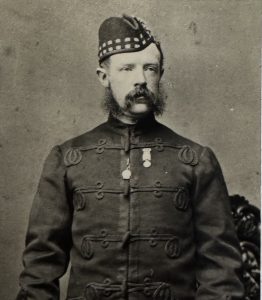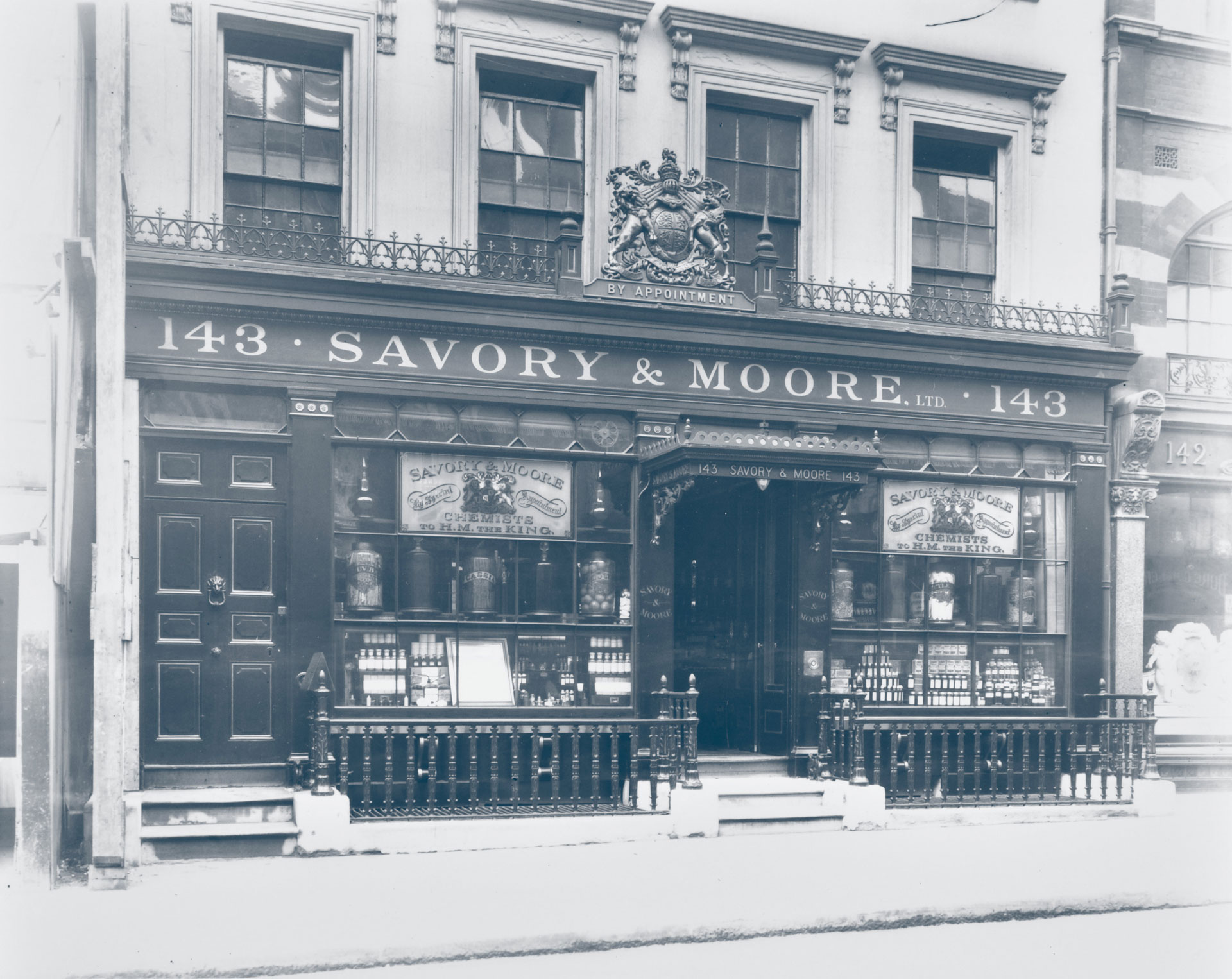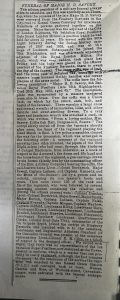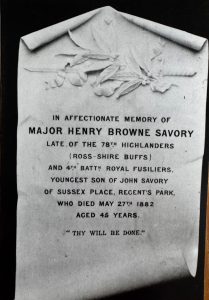-
Place of Birth
London
-
Place of Death
London
-
Burial Place
Catacomb B, Vault 85, Kensall Green Cemetary, London
Henry Browne Savory was the fourth child of John and Martha Savory, born 24th April 1837. Henry was baptised on 13th June 1837 at St George’s, Hanover Square.
He was a colourful character!
Henry Savory was commissioned as an Ensign in H.M.s 90th Light Infantry (Perthshire Volunteers) on 9th October 1855 at the age of 18.5 years. He served with them during the Indian Mutiny (1857-59) taking part in the first relief of Lucknow where he distinguished himself. One of the incidents in which he took part is recorded in his Statement of Service:
“During the defence, whilst in command of an important outpost, he had nearly the whole of his piquet* blown to eternity, and had to defend the place against thousands who were endeavouring to get through the ruins caused by the explosion, with only about four men and a sergeant, until re-inforced.”
* a small temporary military post stationed closer to the enemy than the main formation.
He was severely wounded, losing the sight in his left eye; although one account alleges that this wound was incurred while looting a palace. That would not have been out of character as he himself, recounted how he coveted a sword of a sepoy** officer whom who saw leaving the lines. Henry Browne Savory Chased after him and the sepoy stumbled and fell. “I was on him like a knife and hissed in his ear ‘Cawnpore’, before putting a bullet through his head.” The sword passed to his grandson Kenneth Cyril Arnold Savory.
**an Indian soldier serving under British or other European orders
***The siege of Cawnpore was a key episode in the Indian Rebellion of 1857
In October 1859 Harry transferred to the 78th Foot (amalgamated with Seaforth Highlanders, now part of Royal Regiment of Scotland), shortly before returning to England. Early in 1863 he went to China as A.D.C. to Major General Brown, later becoming his Assistant Military Secretary. While in China he seems to have acquired some more loot. Percy Buckman, his nephew, recalled that Harry’s mother ‘owned several valuable pieces of porcelain sent from China’.
Before retiring in 1869, he saw service in Gibraltar and Canada. From 1871 to the time of his death in 1882, he was Adjutant (with the honorary rank of Major) of the Royal London Militia, which in 1881 became the 4th Battalion The Royal Fusiliers.
Harry seems to have been a ‘character’. Percy Buckman remembered “the Major used to come to us most years for a fortnight’s shooting, bringing his charger [type of warhorse, often a large and powerful mount] and favourite spaniel. He used a twisted stock to his gun…and considering his handicap, made pretty good practice with the birds. Partridges were not the only birds pursued. He was a great favourite with the opposite sex and good company always. An extravagant devil-may-care of a fellow, but with the many lovable qualities. His extravagant habits got him into deep trouble with the Jews and old grandma Savory whitewashed him to a pretty tune shortly before his death.”
His love life, hardly surprisingly, seems to have been complex. He married Amelia Smith on 21st February 1861 in Tottenham, but it was two years before he told anyone in the family about it. His wife was Amelia Smith, described by Melita Savory (his sister-in-law) as ‘the daughter of a small farmer’. In 1874, he had a son by Mrs Julia Millet. The son, Kenneth Douglas, was illegitimate. Henry Savory was promptly disowned by his parents, so it is said. However, there is no evidence to support this story. His father, who had died three years earlier, had left Henry £6,000 plus a third share in his residue estate – in a Will carefully contrived to ensure that Harry’s creditors did not get their hands on the money. His mother in her Will (dated 18th June 1884) left her leasehold house and shop at 29 Chapel Street to her executors on trust with the provision that one third of the income derived therefrom be paid to “Kenneth Douglas Millett, son of Julia Woothorpe Millett of 16 Cambridge Terrace, Hyde Park.”
Henry died suddenly (apoplexy) on 26th May 1882. As one report had it at the time:
“I regret to mention the very unexpected death of one well known at the West End. All in Clubland knew Major Savory, the popular Chairman of the Committee of the Naval and Military Club, Piccadilly. He was seen by many of his friends at different clubs later on Wednesday night, when he went home and never came out again, having died after a few hours illness.”
His funeral arrangements would not have disgraced a General in these more austere days. The cortege, which went from Finsbury Barracks to Kensal Green Cemetery, where he was buried in the Savory family vault in Catacomb B, consisted of the band and a company of the 4th Battalion Royal Fusiliers, the pipers of the 93rd Highlanders, the Drums and Fifes of the 4th Battalion, a gun carriage drawn by six horses carrying the coffin and a further company of the 4th Battalion.
There is a memorial tablet in existence (the location of which is not known), which is inscribed as follows:-
“In affectionate memory of Major Henry Browne Savory
Late of the 78th Highlanders (Ross-shire Buffs)
and 4th Battn Royal Fusiliers
Youngest son of John Savory of Sussex Place, Regent’s Park
who died May 27th 1882 aged 45 years. Thy will be done.”





